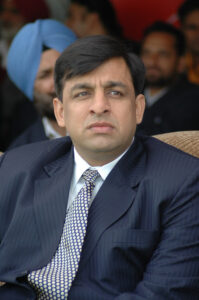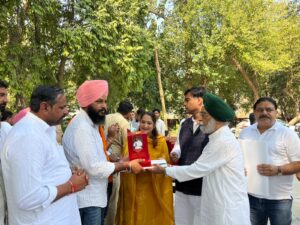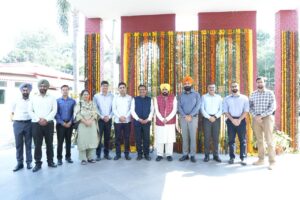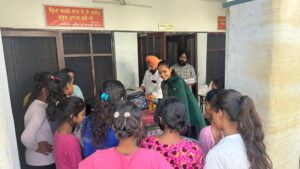JALLIANWALA BAGH SMARAK MUST SERVE AS REMINDER TO FUTURE GENERATIONS OF PEOPLE’S RIGHT TO PEACEFUL DEMOCRATIC PROTEST: PUNJAB CM

Chandigarh, 28 August 2021 : Describing the newly renovated Jallianwala Bagh Smarak as a tribute to the great martyrs and a symbol of inspiration for the youth, Punjab Chief Minister Captain Amarinder Singh on Saturday said the monument must serve as a reminder for the future generations about the right of the people to peaceful democratic protest.
In what was apparently an oblique reference to the ongoing agitation of the peacefully protesting farmers, the Chief Minister said the Smarak, along with the Jallianwala Bagh centenary memorial recently dedicated to the people by the state government, should serve to remind our leaders of the inalienable right of Indians to conduct peaceful democratic protests, which could not be stifled, as the British also learnt from the Jallianwala Bagh incident.
The Smarak and the Centenary Memorial established by the state government “seek to pay tribute to the great martyrs so that history may always remember their sacrifice and our present and future generations can draw inspiration from their patriotism,” said the Chief Minister, in his brief remarks before Prime Minister Narendra Modi virtually dedicated the Jallianwala Bagh National Memorial (Smarak) to the nation through the remote.
Captain Amarinder also requested the Prime Minister that the Government of India should use its good offices to bring back the personal effects, i.e. pistol and personal diary of Shaheed Udham Singh Ji, who avenged the injustice of this massacre, from United Kingdom to India. He said he had already written to External Affairs Minister Dr. Jaishankar in this regard.
The event was also attended, among others, by several union ministers, Punjab Governor, Leader of the Opposition and the Jallianwala Bagh trustees, along with several MPs and MLAs. Families of the Jallianwala massacre martyrs were also present.
The occasion was marked by a 2-minute silence in the memory of the martyrs, following the sounding of the bugle.
Describing the Jallianwala Bagh National Memorial as “an everlasting symbol of non-violent and peaceful struggle for the freedom of India”, the Chief Minister said that “at another level, it also stands testimony to one of the most barbaric acts of violence and State oppression perpetrated on a group of peacefully assembled people.”
The killing of hundreds of innocent people on the fateful day of Baisakhi on 13 April 1919, shook the moral conscience of not only the entire nation but the whole world, he said, adding that the “Khooni Vasakhi”, as the Punjabi poet Nanak Singh who was himself a survivor called it, sounded the death knell of the British Rule in India. He pointed out that incensed by the inhuman act, Gurudev Rabindranath Tagore had renounced his knighthood in protest.
The Jallianwala Bagh is one of the historic landmarks of Amritsar for the lakhs of tourists and pilgrims who visit the Holy City, said the Chief Minister, expressing happiness that, as the nation observes the centenary of the tragedy, the Ministry of Culture had taken up major upgradation of this memorial and given it more technology-oriented displays, including a sound and light show which will draw more people.
Recalling that the story of this sacred monument started in the aftermath of the tragedy, when a resolution was passed in 1920 to build a memorial at the site and subsequently land was purchased by the Trustees, the Chief Minister said that in 1951, soon after India gained independence, the Government declared it as a “memorial of national importance”.
Captain Amarinder observed that the State Government had also recently, on 14 August 2021, dedicated a Jallianwala Bagh Centenary Memorial, at a separate location in Amritsar, as a tribute to the great martyrs to commemorate the Centenary. The said memorial bears the names of all 488 martyrs available as per records, he said, adding that his government had also constituted a Special Research team of Guru Nanak Dev University, Amritsar, to identify any missing names of martyrs that need to be inscribed on this memorial, for which sufficient space has been left.




